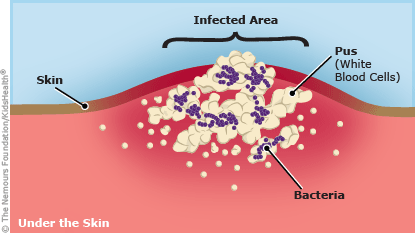- Home
- Humana Medicaid
- Kentucky Medicaid
- Medicaid extras
- Health and wellness
- Parents Home
- Para Padres
- A to Z Dictionary
- Allergy Center
- Asthma
- Cancer
- Diabetes
- Diseases & Conditions
- Doctors & Hospitals
- Emotions & Behavior
- First Aid & Safety
- Flu (Influenza)
- Food Allergies
- General Health
- Growth & Development
- Heart Health & Conditions
- Homework Help Center
- Infections
- Newborn Care
- Nutrition & Fitness
- Play & Learn
- Pregnancy Center
- Preventing Premature Birth
- Q&A
- School & Family Life
- Sports Medicine
- Teens Home
- Para Adolescentes
- Asthma
- Be Your Best Self
- Body & Skin Care
- Cancer
- Diabetes
- Diseases & Conditions
- Drugs & Alcohol
- Flu (Influenza)
- Homework Help
- Infections
- Managing Your Weight
- Medical Care 101
- Mental Health
- Nutrition & Fitness
- Q&A
- Safety & First Aid
- School, Jobs, & Friends
- Sexual Health
- Sports Medicine
- Stress & Coping
MRSA
What Is MRSA?
MRSA is a type of staph bacteria. MRSA (MUR-suh) stands for methicillin-resistant Staphylococcus aureus. It causes infections that can be hard to treat.
Many people have staph bacteria living harmlessly on their skin or in their noses. Staph bacteria that enter the body through a cut, scrape, or rash can cause minor skin infections. Most of these heal on their own if the wound is kept clean and bandaged, but sometimes antibiotics are needed.
MRSA differs from other staph bacteria because it doesn't respond well to most of the antibiotics used to treat staph infections. Bacteria that are hard to kill are called "resistant." They become resistant by changing in some way that prevents the antibiotic from doing its job. Methicillin is an antibiotic normally used to treat staph, so these bacteria are called "methicillin-resistant."
What Are the Signs & Symptoms of MRSA?
MRSA infections look like other skin infections. They often develop around open sores, but also happen on intact skin. There can be red, swollen, painful areas or bumps on the affected skin. They sometimes ooze fluid or pus (an infected area with pus is an abscess). Some kids also have a fever.

In more serious cases, the infection can spread to the blood, lungs, bones, joints, or other parts of the body.
Is MRSA Contagious?
MRSA is contagious. Like all other staph bacteria, it can spread:
- when someone touches a contaminated surface
- from person to person, especially in places where large groups of people are close together (like schools, camps, or college dorms). Often this happens when people with skin infections share personal things like razors, bed linens, towels, or clothing.
- from one area of their body to another, by dirty hands or fingernails
In the past, MRSA mostly affected people in nursing homes or hospitals. It was more likely to be seen in people with weak immune systems. It was also more common in people who had a surgical wound. But now some otherwise healthy people outside of those settings are getting the infection.
Sometimes, people can be "carriers" of MRSA. This means that the bacteria stay on or in their bodies for days, weeks, or even years without causing symptoms. But they can spread it to others. That's why washing hands well and often is so important.
How Is MRSA Diagnosed?
A doctor will examine the affected skin, and sometimes will take a sample of pus or blood. This goes to a lab for testing to find out which bacteria are causing the infection.
How Is MRSA Treated?
Treatment depends on what the infection looks like:
- If there is an abscess, the doctor might make a small cut in the skin over it to let the pus drain out.
- The doctor may prescribe an antibiotic, either to put on the skin or to be taken by mouth (some antibiotics still work for MRSA).
- Someone with a more severe infection might get intravenous (IV) antibiotics in a hospital.
Can MRSA Be Prevented?
These simple steps can help prevent MRSA infections:
- Adults and kids should wash their hands well and often with soap and warm water for at least 20 seconds. Alcohol-based hand sanitizers or wipes are OK if soap and water aren't handy.
- Do not touch or pick at infected areas. Cuts or broken skin should be cleaned and covered with a bandage.
- Don't share razors, towels, uniforms, or other items that come into contact with bare skin.
- If sports equipment must be shared, cover it with a barrier (clothing or a towel) to prevent skin from touching it. The equipment also should be cleaned before each use with a disinfectant that works against MRSA.
How Can Parents Help?
Call the doctor if:
- Your child has a skin area that is red, painful, swollen, and/or filled with pus, especially if he or she has fever or feels sick.
- Skin infections seem to be passing from one family member to another (or among students at school), or if two or more family members have skin infections at the same time.
What Else Should I Know?
Bacteria become resistant to antibiotics when they are not used properly. This includes:
- taking antibiotics for things they can't cure, like illnesses caused by viruses
- not taking all the medicine prescribed
- taking medicine that was prescribed for someone else
Taking antibiotics exactly as prescribed can help stop bacteria from becoming resistant to them. Take these precautions:
- Never give your child someone else's prescription.
- Don't save antibiotics for "next time."
- Always give antibiotics as directed until the prescription is done (unless a doctor says it's OK to stop early).

© 1995- The Nemours Foundation. KidsHealth® is a registered trademark of The Nemours Foundation. All rights reserved.
Images sourced by The Nemours Foundation and Getty Images.